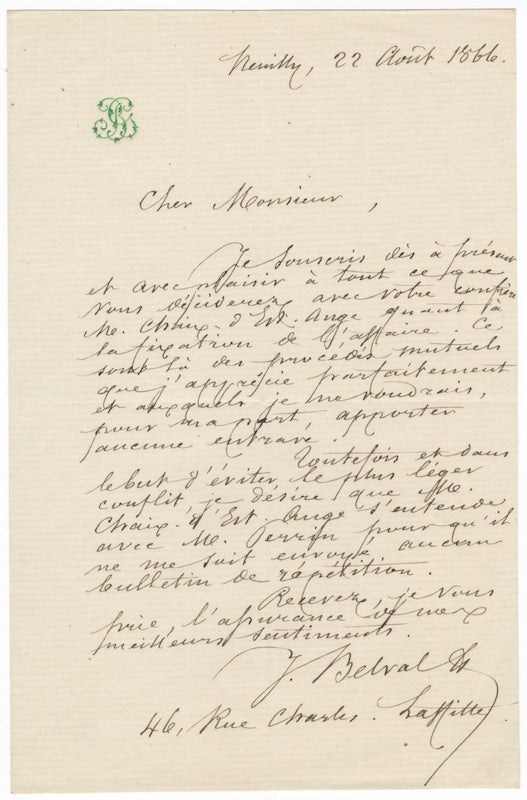
Autograph letter signed "J. Belval" to an unidentified correspondent
1 page of a bifolium. Octavo. Dated Neuilly, August 22, 1866. In black ink on personal stationery with embossed monogram printed in green at head. In French (with translation).
Belval will go along with whatever decisions his correspondent and a certain Mr. Chaix d'Est-Ange make concerning a matter with Émile Perrin, director of the Paris Opera.
"... Those are mutual procedures that I appreciate perfectly and to which, for my part, I would not want to cause any hindrance. All the same, and with the goal of avoiding the most insignificant conflict, I would like Mr. Chaix d'Est-Ange to agree with Mr. [Émile] Perrin that no rehearsal report be sent to me."
Creased at folds.
Belval, a French bass, "studied at the Paris Conservatoire and made his début in 1846 at Antwerp. After singing in Toulouse, Lyons, the Hague, Ghent and Brussels, he was engaged at the Paris Opéra, making his début in 1855 as Marcel in Les Huguenots. His roles included Bertram (Robert le diable), Balthazar (La favorite), Walter Furst (Guillaume Tell) and Zaccharie (Le prophéte). He took part in many premiéres and created Gargantua in Labarre’s Pantagruel (1855), the Count of Poitou in Halévy’s La magicienne (1858), Soloman in Gounod’s La reine de Saba (1862), Archbishop Turpin in Mermet’s Roland à Roncevaux (1864), Don Pédro in L’Africaine (1865) and King Claudius in Thomas’ Hamlet (1868)... he made his last appearance at the Opéra in 1875 as Cardinal Brogni in La Juive, at the public inauguration of the Palais Garnier... His voice was a deep bass, ample in size and dark in tone." Elizabeth Forbes in Grove Music Online.
Mr. Chaix d'Est-Ange was perhaps Gustave Louis Chaix d'Est-Ange (1800-1876) or more likely his son, Gustave Gaspard Chaix d'Est-Ange (1832-1887). Both were important French lawyers and politicians; Gustave Gaspard defended both Flaubert and Baudelaire when they were proscecuted for the supposed indecency of their respective works, Madame Bovary and Les Fleurs du Mal.
Belval certainly sought legal council by 1870; in two letters, dated June 15 and August 20, he recounts in great detail a dispute with Émile Perrin (1814-1885) over the continuation of his contract and his retirement pension at the Paris Opéra (see #24092 of this catolog). It is possible that Belval's relationship with Perrin had already begun to disintegrate when this letter was composed. Indeed, the writer Victorien Sardou had described Perrin as "the most volatile, the most capricious, the most changeable of men." Perrin became the director of the Opéra in 1862, but was dismissed in 1870.
Item #24092
Price: $200.00 other currencies
